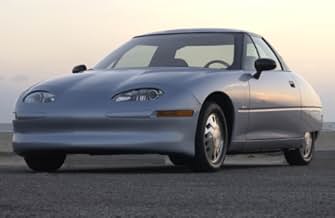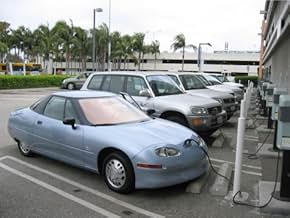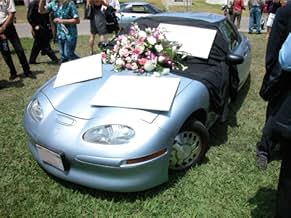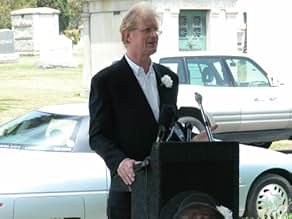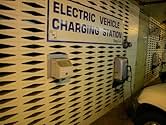CALIFICACIÓN DE IMDb
7.6/10
13 k
TU CALIFICACIÓN
Un documental que investiga el nacimiento y la muerte del coche eléctrico, así como el papel de las energías renovables y la vida sostenible en el futuro.Un documental que investiga el nacimiento y la muerte del coche eléctrico, así como el papel de las energías renovables y la vida sostenible en el futuro.Un documental que investiga el nacimiento y la muerte del coche eléctrico, así como el papel de las energías renovables y la vida sostenible en el futuro.
- Dirección
- Guionista
- Elenco
- Premios
- 4 nominaciones en total
Martin Sheen
- Narrator
- (voz)
Reverend Gadget
- Self
- (as Greg 'Gadget' Abbott)
David Freeman
- Self
- (as S. David Freeman)
Frank Gaffney
- Self
- (as Frank J. Gaffney Jr.)
- Dirección
- Guionista
- Todo el elenco y el equipo
- Producción, taquilla y más en IMDbPro
Opiniones destacadas
I'm neither a liberal or a conservative (yes, there are other options!)and while I expected to read the usual 'party lines' concerning the politics of this movie ... I was AMAZED at how many people missed the point of the movie. This wasn't, at its heart, a movie about the politics of energy. Rather, it was a human story about people who found, and even fell in love, with a preferred form of transportation, only to have it taken away from them against their will. ***CAUTION --- POSSIBLE SPOILERS AHEAD*** I don't think what I'm about to say will spoil the movie experience, but I decided to play it safe. The most amazing part of the story, to me, concerns the quiet battle between General Motors and the EV1 lessees who wanted desperately to keep their vehicles. Why did GM take such a hard core approach? It seemed to me a more conciliatory approach would have done the embattled auto-maker a world of good. To me, that was the question that drove the story. Yes, most of the people who apparently leased one of GM's electric cars were celebrities and/or people of some measure of wealth. So what? Anyone who likes electronic gadgetry has heard the expression "early adopter," referring to those with money who purchase state-of-the-art equipment at high prices, thereby fueling the development and investment that pushes products to consumer-level pricing. GM's inability to realize this is what makes the whole story fascinating. I encourage anyone who would, to watch the movie closely, and see If this doesn't ring true. Now, having said my piece about the movie, let me throw some comments about energy policy into the fray. 1) We absolutely, positively need gas to reach a price of $5 a gallon or more. Why? Supply and demand. Only when it HURTS to drive a gas guzzler, will most of us finally get off that doomed bandwagon. 2) We had a solution to coal produced electricity in our laps twenty years ago, and a piece of Hollywood drivel ("The China Syndrome")turned us into weenies. Yes, folks, I mean nuclear power. It CAN and IS producing power safely, and environmentally soundly. Just not here in the U.S., by and large. Finally, 3) Supporting the development of electric-only cars is a viable choice. With the improvements being made in solar panel technology, I suspect a working battery-solar hybrid may be a very real option in the NEAR future. If we avoid the stupidity this movie helps us to understand.
As a former engineer with both GM and Ford, I have to thoroughly refute what a previous commenter has stated about likely explanations. With the technology of the powertrain/fuel source development that far along, that far advanced within a viable vehicle, crash-safety and equipment regulations would not have removed this from the marketplace. The "skin" and tub/framework of the vehicle would have been either reworked to comply or the powertrain/fuel source would have been adapted to fit existing car lines that meet crash-safety and equipment regulations. There are plenty of examples of "hurry up" retro-fits in Detroit/Dearborn's history. Unfortunately there is much documented history of technology being quashed, patents being bought and buried, innovations left by the wayside to discourage change, discourage having to retool, reinvent, reinvest...and if you don't think that auto/oil/gov are all complicit in this, how naive can one be? GM and the railroads, the Tucker, fuel injection, Wankel engine, anti-lock brakes...all quashed by powerful companies and people not wanting change no matter what the benefit would be in safety, society, or the environment.
This movie really highlights problems with American business. It seems that even after killing the electric car, there is actually a concerted effort afoot to kill the electric car movie. I can see that someone might not give it a 10 but a 2? Come on, its a great movie. Someone appears to be lowballing the vote. How anyone can build a love story and turn it into a tragedy -- about a car is amazing but unfortunately believable. I don't believe in conspiracy theories but I guess here it is just a strongly for or strongly against issue so it really isn't a conspiracy. However, I see the misinformation brigade that the movie caught in its own lies is at it even here at IMDb. Can you imagine a car company recalling all its cars, crushing them and killing the entire line just because a safety standard changed? Come on, whoever wrote that, please tell us what wavers were made? That explanation just doesn't make sense. A little more engineering and any problems (if there are any) can be solved. I highly recommend that anyone who drives, breathes, or hates to buy gas should see this movie.
How can you fit decades of events into two hours? And, not appear to have an agenda? Mr. Paine and his crew did a good job creating a synopsis of the events affecting the Electric Vehicle, and its subsequent effect on us as a society. He also more clearly outlined why we should pay more attention to the EV, and how it played such a key role in the history of our country.
The main thrust of this movie is to educate the public about the actions of key players in shaping our society through their policies on transportation and energy, and how powerful those policies have proved to be in affecting us as a nation. I came away with a better understanding of what I had only guessed at before, and I am very glad that Mr. Paine chose to give the concern-inspiring events first but leave us with a sense of optimism for the future.
The only fault I can find with this movie is that it necessarily has to cover a lot of factual information, something that makes it a lot like reading a good book, rather than viewing a movie. But, if it makes you take a good look at why we're paying over $3/gallon for gas, then it's a good book indeed.
The main thrust of this movie is to educate the public about the actions of key players in shaping our society through their policies on transportation and energy, and how powerful those policies have proved to be in affecting us as a nation. I came away with a better understanding of what I had only guessed at before, and I am very glad that Mr. Paine chose to give the concern-inspiring events first but leave us with a sense of optimism for the future.
The only fault I can find with this movie is that it necessarily has to cover a lot of factual information, something that makes it a lot like reading a good book, rather than viewing a movie. But, if it makes you take a good look at why we're paying over $3/gallon for gas, then it's a good book indeed.
Probably the most alarming thing about this story of how the electric car was literally destroyed is what it reveals about the power of corporations to control our lives. Film maker Chris Paine, himself an EV1 owner, makes it clear that it was big corporations, especially big oil, and most especially General Motors itself, that woke up one day and asked themselves the multi-billion dollar question: Is an economical and efficient electric vehicle really good for business? In the case of the oil companies, obviously not since such a vehicle would not be burning any gas or needing any motor oil. In the case of the car manufacturers themselves, especially GM, which actually spent some very serious bucks on developing the EV1, the answer came as a bit of a surprise. First of all, they asked themselves, in the long run are you going to make more money building small efficient vehicles or behemoths like the Hummer? It didn't take long for them to figure out that the profit margins would be higher with the bigger vehicles. And then they realized that with the EV1 they wouldn't be able to sell many of their combustion-engine parts like oil filters and such. Furthermore, the EV1 was built to comply with California law. Doing some more thinking, GM realized that it would never do to allow some state government to tell them what to manufacture. If things worked out in California, before you know it, the whole nation might very well go plug-in.
So, as shown so vividly in this documentary, the car manufactures and the oil companies bought up or scared enough politicians so that the law requiring zero emissions in California went the way of the dodo. Meanwhile GM, which had been leasing the EV1, recalled them all and literally destroyed them. Paine has some nice footage showing the brand new and near brand new cars being crushed while EV1 lovers protested in vain. Nationally of course we know about the bills congress passed allowing truck-sized vehicles to continue to guzzle gas (mostly SUVs) and how 6,000-pound vehicles were given massive tax breaks for small business owners (mostly anybody but a wage earner).
There is of course plenty of controversy about whether the story presented by Paine (narration by Martin Sheen, by the way) is fair and accurate. I did a little research--there is a ton of information on the Web--and what became obvious after not too long was that the electric car not only is a viable alternative to the combustion engine car but really is the wave of the future whether General Motors and the other car manufacturers know it or not. For now, however, they are not about to change their ways. They have too much of a vested interest in business as it is.
The hydrogen fuel cell red herring is addressed, and, with help from Joseph J. Romm, who wrote The Hype about Hydrogen: Fact and Fiction in the Race to Save the Climate (2004), which I highly recommend, got fed to the dogs. Naturally there is a clip of George W. Bush pretending to support the hydrogen fuel cell car, even though I am sure he knows that economically it's not even close to a match for the electric car. Getting the Great Prevaricator to advance the propaganda put out by the oil and vehicle companies surely is something close to proof positive that it's BS.
Especially watchable is the clip from Huell Howser's PBS show in which we get to see the EV1s not only being crushed but pulverized into little bits for recycling.
So, what's it all about, Alfie? It's just as Eisenhower warned: beware not just of the industrial-military complex taking over our lives, but beware of corporations in general buying up all the politicians and writing all the laws. In fact, with the way the mass electorate is influenced by advertising, only politicians pre-approved through campaign donations from big corporations have a chance of even getting the nomination of either of the two main political parties. And without that nomination, effectively speaking, they can't win.
Regardless of all the machinations by GM, et al., I think our grandchildren will be driving mostly electric vehicles with nary a gas station in sight. And they will be inundated with "green" ads in the media with lots of flowers and little girls paid for by General Motors and Toyota, telling us how they are responsible for the shiny, new clean world.
(Note: Over 500 of my movie reviews are now available in my book "Cut to the Chaise Lounge or I Can't Believe I Swallowed the Remote!" Get it at Amazon!)
So, as shown so vividly in this documentary, the car manufactures and the oil companies bought up or scared enough politicians so that the law requiring zero emissions in California went the way of the dodo. Meanwhile GM, which had been leasing the EV1, recalled them all and literally destroyed them. Paine has some nice footage showing the brand new and near brand new cars being crushed while EV1 lovers protested in vain. Nationally of course we know about the bills congress passed allowing truck-sized vehicles to continue to guzzle gas (mostly SUVs) and how 6,000-pound vehicles were given massive tax breaks for small business owners (mostly anybody but a wage earner).
There is of course plenty of controversy about whether the story presented by Paine (narration by Martin Sheen, by the way) is fair and accurate. I did a little research--there is a ton of information on the Web--and what became obvious after not too long was that the electric car not only is a viable alternative to the combustion engine car but really is the wave of the future whether General Motors and the other car manufacturers know it or not. For now, however, they are not about to change their ways. They have too much of a vested interest in business as it is.
The hydrogen fuel cell red herring is addressed, and, with help from Joseph J. Romm, who wrote The Hype about Hydrogen: Fact and Fiction in the Race to Save the Climate (2004), which I highly recommend, got fed to the dogs. Naturally there is a clip of George W. Bush pretending to support the hydrogen fuel cell car, even though I am sure he knows that economically it's not even close to a match for the electric car. Getting the Great Prevaricator to advance the propaganda put out by the oil and vehicle companies surely is something close to proof positive that it's BS.
Especially watchable is the clip from Huell Howser's PBS show in which we get to see the EV1s not only being crushed but pulverized into little bits for recycling.
So, what's it all about, Alfie? It's just as Eisenhower warned: beware not just of the industrial-military complex taking over our lives, but beware of corporations in general buying up all the politicians and writing all the laws. In fact, with the way the mass electorate is influenced by advertising, only politicians pre-approved through campaign donations from big corporations have a chance of even getting the nomination of either of the two main political parties. And without that nomination, effectively speaking, they can't win.
Regardless of all the machinations by GM, et al., I think our grandchildren will be driving mostly electric vehicles with nary a gas station in sight. And they will be inundated with "green" ads in the media with lots of flowers and little girls paid for by General Motors and Toyota, telling us how they are responsible for the shiny, new clean world.
(Note: Over 500 of my movie reviews are now available in my book "Cut to the Chaise Lounge or I Can't Believe I Swallowed the Remote!" Get it at Amazon!)
¿Sabías que…?
- TriviaThe boxy, small EV shown being crushed in the movie was the Honda EV-Plus. They, like the sleek GM EV-1, were only available for lease; several returned to Honda, and were converted into fuel cell demonstration vehicles. For a while, you were able to lease them through EV Rentals (at several Budget Rent a Car locations).
- Citas
Mel Gibson: Who writes the history? Um, well... The guy with the biggest club.
- Bandas sonorasJane's Theme
from El piso 13 (1999) (as The 13th Floor)
Composed by Harald Kloser
Courtesy of Centropolis Entertainment
Selecciones populares
Inicia sesión para calificar y agrega a la lista de videos para obtener recomendaciones personalizadas
- How long is Who Killed the Electric Car??Con tecnología de Alexa
Detalles
- Fecha de lanzamiento
- País de origen
- Idioma
- También se conoce como
- EV Confidential
- Locaciones de filmación
- Productoras
- Ver más créditos de la compañía en IMDbPro
Taquilla
- Presupuesto
- USD 1,000,000 (estimado)
- Total en EE. UU. y Canadá
- USD 1,678,874
- Fin de semana de estreno en EE. UU. y Canadá
- USD 45,138
- 2 jul 2006
- Total a nivel mundial
- USD 1,764,304
- Tiempo de ejecución1 hora 32 minutos
- Color
- Mezcla de sonido
- Relación de aspecto
- 1.75 : 1
Contribuir a esta página
Sugiere una edición o agrega el contenido que falta

Principales brechas de datos
By what name was Who Killed the Electric Car? (2006) officially released in India in English?
Responda

